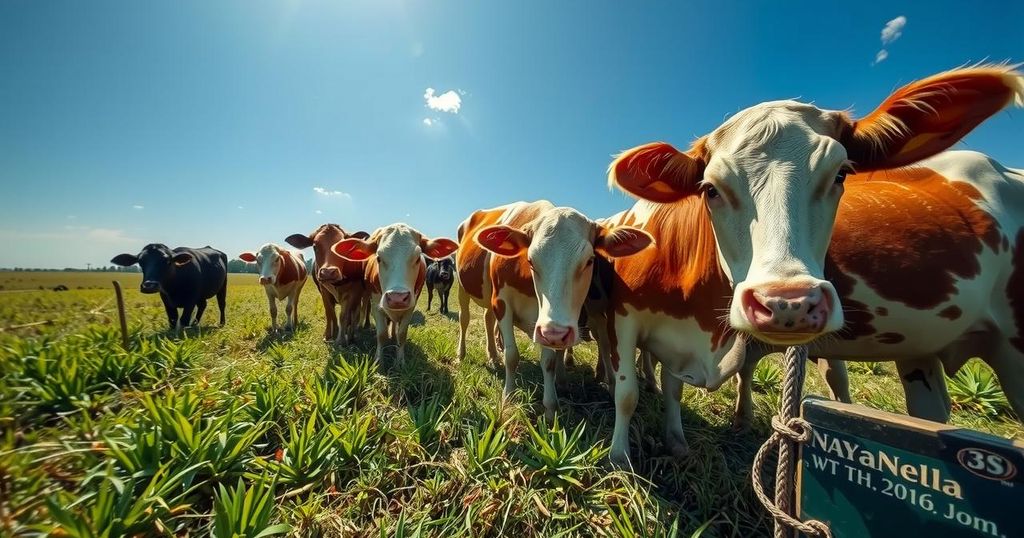Reevaluating the Role of Livestock in Climate Policy: Partners in Environmental Solutions
The article emphasizes the critical importance of livestock in climate action and rural livelihoods in Africa, arguing against the narrow view that labels livestock as solely harmful to the environment. It advocates for sustainable livestock management as a means to promote biodiversity, aid climate resilience, and support food security. Recognizing the complex role of livestock is crucial, especially as international climate discussions convene.
Climate policies should not dismiss the significance of livestock in addressing environmental challenges and supporting vulnerable communities. In Africa, livestock plays a crucial role in both food systems and rural economies, with approximately 400 million cattle contributing to 30 to 40 percent of the agricultural GDP across the continent. Livestock provides essential nutrition through meat, milk, and eggs, alleviating malnutrition, while also serving as a stable source of income, especially in the absence of alternatives. Despite the valuable roles livestock play, they are frequently viewed solely as environmental liabilities, linked to habitat loss and greenhouse gas emissions. This limited perspective hinders necessary investments in sustainable livestock practices. As international discussions on climate and biodiversity convene in Colombia, it is crucial to reevaluate the role of livestock in climate action. Livestock, including cows, goats, camels, and pigs, can be significant allies in biodiversity conservation when managed effectively. Sustainable grazing methods can enhance ecosystems, control invasive species, and restore native vegetation in degraded lands. Pastoralist communities in Kenya understand the benefits of integrating livestock grazing within conservation strategies, supporting both agriculture and wildlife management simultaneously. From a climate action standpoint, livestock can contribute positively when proper management techniques are employed. Strategies such as improved rangeland management and climate-smart feed practices can notably lower emissions associated with livestock farming. Notably, well-managed rangelands not only serve as crucial carbon sinks but can also facilitate significant climate mitigation by storing carbon and promoting soil health. Moreover, livestock are vital for adapting to the consequences of climate variability, especially in arid regions like Kenya. Their mobility allows pastoralists to effectively navigate scarce resources, and indigenous livestock breeds are often better suited to survive harsh conditions, enhancing community resilience. As global land degradation presents increasing challenges, proper livestock management can also aid in land restoration. Sustainable practices can rehabilitate degraded rangelands, enhance soil fertility, and promote ecosystem health by preventing overgrazing and fostering diverse plant growth. The pressing question remains: Why is there limited funding for the livestock sector, despite its critical contributions to environmental solutions? It is imperative that international climate finance acknowledges and prioritizes sustainable livestock systems, recognizing their role in promoting food security, livelihoods, and economic growth. Livestock should not be perceived as adversaries in the fight against environmental issues; rather, they represent a crucial part of the solution, particularly in regions like Africa where many communities rely on them for survival.
This article discusses the multifaceted role of livestock within the context of climate policies, particularly in Africa, where livestock accounts for a significant portion of agricultural output and supports rural livelihoods. The piece highlights common misconceptions related to livestock management and their environmental impacts, advocating for a more comprehensive understanding of livestock as potentially beneficial to biodiversity, climate action, and food security. The upcoming UN meetings present an opportunity to reshape discussions about livestock and their contributions to sustainable development.
In summary, livestock are integral to both the ecological and economic landscapes, particularly in Africa. Properly managed livestock can significantly benefit biodiversity conservation, enhance climate resilience, and aid in land restoration. It is essential that policymakers recognize the vital contributions of the livestock sector and redirect climate finance towards sustainable livestock practices to harness their potential for addressing pressing environmental challenges. Livestock should be embraced as partners in climate solutions, not disregarded as problems.
Original Source: www.aljazeera.com




Post Comment